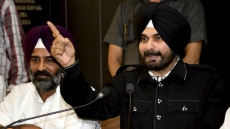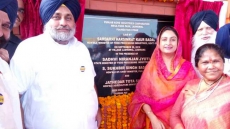A day after India told the United Nations that Pakistan was peddling, nurturing and exporting terrorism, New Delhi Tuesday summoned the Pakistani envoy and informed him that two persons, who guided the Uri attackers to the Army camp, were from Muzaffarabad in Pakistan-occupied Kashmir.
India also named one of the four terrorists killed in the attack and their two handlers across the Line of Control. Eighteen soldiers died in the dawn attack on September 18.
Foreign Secretary S Jaishankar told Pakistan High Commissioner Abdul Basit that the government had evidence that the attack originated from territory under Pakistani control.
Separately, India said it had also apprehended another person who confessed he had trained for three weeks with the Lashkar-e-Toiba and made donations to Falah-e-Insaniat Foundation, a Lashkar front.
Jaishankar offered Pakistan consular access to the three individuals in custody. This was the second time since the Uri attack that the
Pakistani envoy has been summoned by the Foreign Secretary. He had earlier informed Basit about the recovery of several items from the terrorists — GPS, grenades with Pakistani markings, communication equipment, food, medicines and clothes made in Pakistan.
Vikas Swarup, spokesperson for the Ministry of External Affairs, said villagers in the Uri sector apprehended two individuals on September 21 and turned them over to security forces. They acted as guides for terrorists and helped them infiltrate across the LoC, he said.
The two men were identified as Faizal Hussain Awan, 20, s/o Gul Akbar, resident of Potha Jahangir, Muzaffarabad; and, Yasin Khursheed, 19, s/o Mohammed Khurshid, resident of Khiliana Kalan, Muzaffarabad.

During questioning, Faizal told the National Investigation Agency (NIA) that they had guided and facilitated the border crossing of the group that attack the Army camp.
“In his preliminary statement, he identified as among the slain attackers one Hafiz Ahmed s/o Feroz, r/o village Dharbang, Muzaffarabad. He also revealed details of the two handlers of this operation — Mohd Kabir Awan and Basharat,” Swarup said.
On September 23, Pakistani national Abdul Qayoom, a resident of Sialkot, was apprehended in the Molu sector that faces Pakistan’s Sialkot sector. “The individual has confessed to undergoing three weeks of training with the terrorist group Lashkar-e-Toiba and donating substantial funds to Falah-e-Insaniat Foundation, their front organisation,” Swarup said.
“We are willing to provide the Pakistan High Commission consular access to these three individuals apprehended in connection with terrorist attacks in India,” Jaishankar was quoted as having told Basit.
Referring to the earlier meeting between Jaishankar and Basit, Swarup said: “At that time, it was also conveyed that a number of items had been recovered from recent terrorist attacks that denote the involvement of organisations and individuals based in Pakistan. It was further communicated that if Pakistan wishes to investigate these cross-border attacks, Government of India is ready to provide fingerprints and DNA samples of terrorists killed in the Uri and Poonch incidents.”

“We would once again strongly urge the Government of Pakistan to take seriously its commitment not to allow terrorist attacks against India from its soil and territory under its control. Continuing cross-border terrorist attacks from Pakistan against India are unacceptable,” he said.




